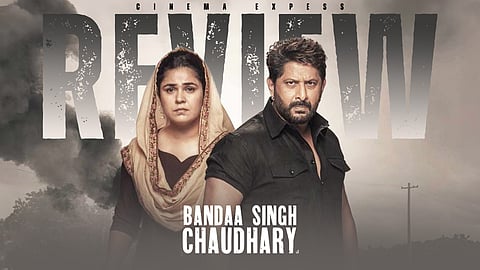Bandaa Singh Chaudhary Movie Review: Arshad Warsi’s period-drama is a major misfire
Bandaa Singh Chaudhary(1.5 / 5)
Arshad Warsi’s latest release, Bandaa Singh Chaudhary has very little going on that can sustain its feature-length duration. Most of its narrative beats and plot points are revealed in the two brief trailers that the makers released. Writers Shaheen Iqbal and Abhishek Saxena (also director) create scenes with a generic ambiguity without paying much attention to delve into characters and their struggles. Everything is told, nothing is made to believe.
Naseeruddin Shah’s baritone voice over sets the background for the story in a brief and vaguely put together opening sequence. Through visuals of passengers in a car being nonchalantly gutted down with a rifle, it is mentioned rather poetically that in the 1980s, Punjab, a land of the Gurubaani and Bulleh Shah, was infused with bullets of extremism. Further, words like ‘ISI’, ‘Bangladesh’ and ‘1971 war’ are heard. Yet, the background in which the story takes place is never clear. It almost feels as if the film unfolds in an alternative universe where history is written without mentioning important parts that shaped it. For instance, there is no mention of the emergency or the Khalistan movement when the story is set between 1975 and 1980. The reason for Sikhs to be taking up arms is conveniently blamed on Pakistan without delving into it for more than a few minutes. The relation to real-events is seemingly evaded and what remains then is a patchy socio-political drama where the S and P remain silent from the get-go.
Starring: Arshad Warsi, Meher Vij, Jeeveshu Ahluwalia, Shataf Figar, Kiara Khanna, Shilpi Marwaha and Alisha Chopra
Directed by: Abhishek Saxena
This is a story of Bandaa Singh Chaudhary (Arshad), who falls in love with Lalli (Meher Vij) and takes a marriage proposal to her parents. Her brother is not too pleased seeing the relationship prosper as Bandaa is a Hindu and Lalli, a Sikh. Her parents, however, are surprisingly progressive. After this, the story shifts five years ahead, when the two are happily married with a daughter, living close to Tejinder (Jeeveshu Ahluwalia), Bandaa’s best friend. Soon, trouble ensues when the extremists start targeting Hindus living in the village and put up notices outside Bandaa’s house to vacate it or die. He is unmoved initially with the threats and continues going about his life. It takes the death of a close-aide for him to really take it all seriously, as he decides to fight back.
More than moments of love and friendship, which it should have had in abundance, the screenplay is filled with logical inconsistencies. The police are shown as a helpless bunch, shooing away anyone who comes to complain about these attacks. Moreover, later, Bandaa is supplied with some unregistered guns and swords by an inspector, and Bandaa says that he doesn’t know how to use them because he is just a simple farmer. Yet, later, when he returns with them after an ‘inspiring exchange’ with the cop, Bandaa gives heavy combat lessons to others. There is little revealed of his background, and we do not know much about his occupation. How does he operate a rifle without a single flinch?
Due to such erratic choices in the writing, there is a disjoint felt even in Arshad’s performance. Coming back with a theatrical release after two years since the debacle of Bachchhan Paandey (2022), Arshad tries to bring an earnest appeal to his screen presence through a mix of quirk and grim. Yet, nothing that he does or says really makes you root for the character. Meher, too, has little emotional ground to cover as she virtually remains in the background for the most part. When she does get a chance to show her acting prowess in the climax, it is already too late. Shataf Figar plays a negative role of a terrorist with ease, and there is little that really stands out in the performances of the rest.
It is rather concerning that barring just a few titles in Arshad’s filmography, rest all are middling comedies. He is someone who has played a no-nonsense cop in the procedural Sehar (2005), a lawyer who finds a conscience in the amusing Jolly LLB (2013), a lovelorn petty criminal in the darkly comic Ishqiya (2010), and a NIA officer on a quest to unravel the truth in the thriller Irada (2017) – all with compelling honesty. Bandaa Singh Chaudhary could have been an addition to the list, with its serious themes, but is marred with a lackluste rexecution. His versatility needed a far better film.


